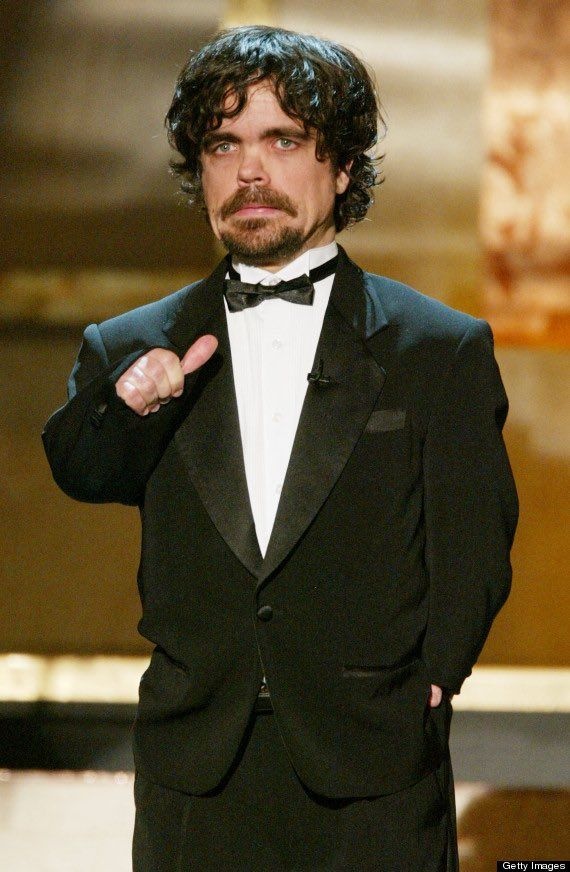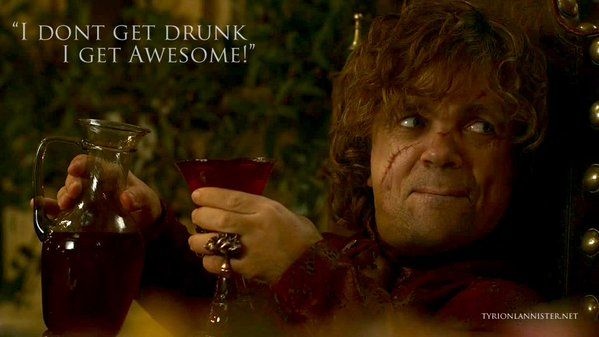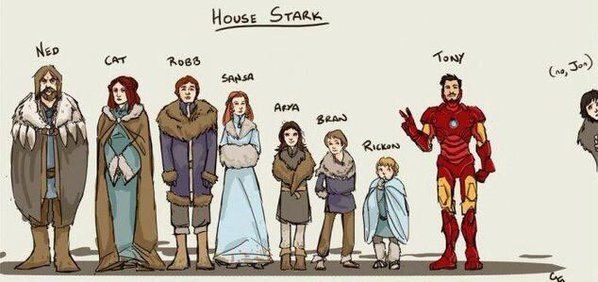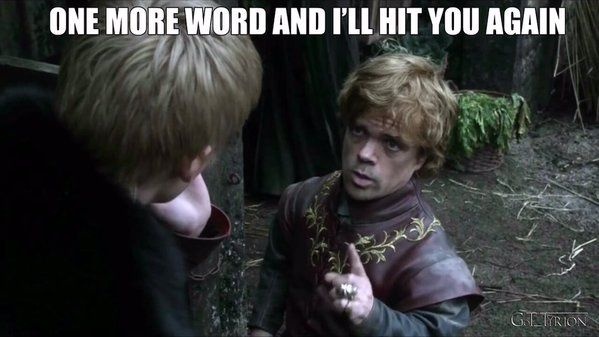Tyrion Lannister





In A Game of Thrones (1996), Tyrion is introduced as the third and youngest child of wealthy and powerful Tywin Lannister, the former Hand of the King. Tyrion's elder sister Cersei is the Queen of Westeros by virtue of her marriage to King Robert Baratheon, and Cersei's male twin Jaime is one of the Kingsguard, the royal security detail. Described as an ugly ("for all the world like a gargoyle"), malformed dwarf with mismatched green and black eyes, Tyrion possesses the pale blond hair of a Lannister but has a complicated relationship with the rest of them.[7][8] While he is afforded the privilege and luxuries of his family, he is treated as a "second class noble" because of his stature.[9] Additionally, Tyrion's mother Joanna had died giving birth to him, and Tywin and Cersei loathe him because they blame him for her death. While Tywin bears no affection for Tyrion, he nevertheless feels a sense of duty to his son, raising him in the Lannister fold and extending Tyrion a share of the family wealth. In contrast to Tywin and Cersei, Jaime has great affection for Tyrion, and treats him with kindness, respect, friendship and love.[10] Lev Grossman of Time wrote in 2011:
Tyrion Lannister [is] the brilliant, black-witted dwarf whose family has had the firmest grip on power for much of the series, though that's not saying much. Tyrion is another good example of what separates Tolkien and Martin. Tyrion isn't a hearty, ax-wielding, gold-mining member of a noble dwarven race. He's not Gimli. Tyrion is an actual dwarf, achondroplastic and stubby-limbed, a joke to passersby and an embarrassment to his family.[11]
Tyrion is intelligent, witty and well-read, and shares his father's skill for business and political maneuvering.[10] Grossman describes the character as "a bitter, cynical, high-born dwarf", calling him "Martin's Falstaff".[12] David Orr of The New York Times notes Tyrion to be "a cynic, a drinker, an outcast and conspicuously the novels' most intelligent presence."[2] As an outcast, he displays sympathy for other outcasts, and the otherwise mistreated; the TV series version of the character commiserates with the illegitimate son of Ned Stark by saying "All dwarfs are bastards in their father's eyes."[13] Still, he is usually seen for his deformities and vices, rather than his virtues and good deeds.[10] Tom Shippey of the Wall Street Journal points out that other characters underrate Tyrion: "His dwarf-status acts as a kind of protection, because — though he is probably the most intelligent character in the whole cast list — no one takes him seriously."[14] Acknowledging that Tyrion's wit, humor and cunning are his survival mechanism, actor Dinklage told The New York Times that "He knows he has no skills with the sword, and this is a world that is really deeply violent. Military rules. He would not be able to survive in that world, given his own strength. So he beats people to the punchline – he's entertaining."[9]
Creation and overview[edit]
In 1981, Martin was collaborating with Lisa Tuttle on a trio of novellas that would be published as the novel Windhaven:
So while we were writing the books we thought about a dwarf who would have been the Lord of one of the islands. He had to be the ugliest person in the world but the most intelligent too. I kept that idea in my mind and it reappeared to me when I was starting to write Game of Thrones. So ... That's Tyrion Lannister.[1]
Tyrion is a prominent point of view character in the novels, and both David Orr of The New York Times and Lev Grossman of Time called him one of Martin's "finest creations."[2][11] Noting the character to be one of Martin's most popular, Dana Jennings of The New York Times called Tyrion "a bitter but brilliant dwarf whose humor, swagger and utter humanity make him the (often drunken) star of the series."[3] Thomas M. Wagner wrote in 2001 that the character "may very well be the strongest antihero in all of contemporary fantasy."[15] Dan Kois of The New York Times also noted in 2012 that "for fans of the novels, Tyrion is among the most beloved among the scores of kings, warriors, wenches, slaves, queens and monsters that populate George R. R. Martin's world."[16] Martin said, "My readers identify with the outcast, with the underdog, with the person who's struggling rather than the golden boy."[16]
Martin himself has singled out Tyrion as his favorite character in the series.[1][4][17] Asked why, Martin said in a 2000 interview:
I think his wit is appealing. He gets off a lot of good iconoclastic, cynical one-liners, and those are fun to write. He's also a very gray character. All my characters are gray to a greater or lesser extent, but Tyrion is perhaps the deepest shade of gray, with the black and white in him most thoroughly mixed, and I find that very appealing. I've always liked gray characters more than black-and-white characters ... I look for ways to make my characters real and to make them human, characters who have good and bad, noble and selfish, well-mixed in their natures. Yes, I do certainly want people to think about the characters, and not just react with a knee-jerk. I read too much fiction myself in which you encounter characters who are very stereotyped. They're heroic-hero and dastardly-villain, and they're completely black or completely white. And that's boring, so far as I'm concerned.[17]
Tyrion appears first in A Game of Thrones (1996), and then in A Clash of Kings (1998) and A Storm of Swords (2000). He is one of a handful of "sorely missed" major characters that do not appear in 2005's A Feast for Crows,[18] but on his website in 2006 Martin released a sample chapter featuring Tyrion from his next novel A Dance with Dragons.[19] In advance of the publication of A Dance with Dragons in 2011, Martin confirmed Tyrion's presence in the novel and called him one of "the characters people have been waiting for."[20] Grossman concurred, writing of A Dance with Dragons, "Now the camera has swung back to the main characters: Jon Snow and Daenerys Targaryen and Tyrion Lannister."[11] James Poniewozik ofTime added that the return of these "favorite characters" gave A Dance with Dragons a "narrative edge" over A Feast for Crows.[21] In April 2012, Martin read a Tyrion chapter from his forthcoming The Winds of Winter at Eastercon;[5] a second Tyrion chapter was read at Worldcon in August 2013 and later released in the official A World of Ice and Fire iOSapplication on March 20, 2014.[6][22][23]
In 2013 Bantam Books published The Wit & Wisdom of Tyrion Lannister, an illustrated collection of Tyrion quotes from the novels.[7][24][25][26]
Development[edit]
As A Game of Thrones begins, Tyrion is a witty, hedonistic curiosity, protected by his family status but still the object of subtle derision. He is perhaps the most intelligent member of his family, but consistently underestimated and marginalized.[2][14] Tyrion embraces the advantages of being a Lannister, but at the same time is all too aware of its negative aspects, and his own place as the embarrassment of the family. Initially he is the one Lannister remotely sympathetic to the Starks, but he is soon caught in the middle of the escalating conflict between the two Houses.[27] Taken prisoner and put on trial for his life, "all of his skills at conniving must be brought to bear simply to stay alive."[27] With the Starks and Lannisters now fully at war, Tywin tasks Tyrion to manage affairs at King's Landing, recognizing that his son is intelligent, clever and has inherited his skills with statecraft. In A Clash of Kings, Tyrion relishes his new power, but finds that his sincere efforts to stabilize his nephew Joffrey's rule are being undermined and thwarted by the misguided and self-serving machinations of everyone around him. He plots to nullify the counterproductive whims of Joffrey and Cersei, but the "much-maligned dwarf" finds himself "teetering between order and disaster as he tries to keep the Lannisters from losing absolutely everything."[15] Thomas M. Wagner calls it a "defining moment" when Tyrion comments that he is all that keeps chaos from overwhelming the family and population who both despise him.[15] Roberta Johnson of Booklist likens Tyrion to the calculating title character of Robert Graves' I, Claudius.[28]
In A Storm of Swords, Tywin reclaims the office of Hand of the King and gives Tyrion the seemingly-impossible task of turning the failing royal finances around. Tyrion's previous efforts, crucial in keeping Joffrey in power and saving King's Landing from invasion, are all but forgotten. Joffrey, emboldened by Tywin's return, publicly humiliates Tyrion; when Joffrey is murdered immediately after, everyone eagerly points the finger at Tyrion. Cersei does everything in her power to assure that he is declared guilty at trial. Innocent, but condemned to death and hated more than ever, Tyrion takes a dark turn. Martin explains:
[Tyrion]'s lost everything ... He's lost his position in House Lannister, he's lost his position in court, he's lost all of his gold – which is the one thing that's kind of sustained him throughout his life ... and he's also found out that Jaime – the one blood relation that he loved unreservedly and has his back, and was always on his side – played a part in this traumatic event of his life, the ultimate betrayal ... He's so hurt that he wants to hurt other people ... and he knows that just up this ladder is a chamber that was once his that now his father has usurped from him ... And I don't think he knows what he's gonna say or do when he gets up there but he – some part of him feels compelled to do it. And of course then we find Shae there, that's an additional shock to him, an additional knife in his belly. I think sometimes people just get pushed too far, sometimes people break. And I think Tyrion has reached his point. He's been through hell, he's faced death over and over again, and he's been betrayed, as he sees it, by all the people that he's tried to take care of, that he's tried to win the approval of. He's been trying to win his father's approval all his life.[29]
Finding his former lover Shae in his father's bed, Tyrion strangles her to death. Confronting Tywin with a crossbow soon after, he ultimately murders his father as well.[11] To Martin, "the two actions are quite different, although they occur within moments of each other." The author continues, "He's furious at Lord Tywin because he found out the truth about his first wife and what happened to her, and ... Lord Tywin is convinced that since he doesn't love Tyrion, then no one can possibly love Tyrion." As Tywin repeatedly calls Tyrion's tragic first wife Tysha a "whore," Tyrion warns him to stop. Tywin has always taught his son that you must follow through on your threats if you are defied, so when he fails to heed Tyrion's warning, the dwarf kills him. "And it will haunt him. Tywin was his father and that will continue to haunt him, probably for the rest of his life," says the author.[29] To Martin, Shae's murder is something else:
With Shae, it's a much more deliberate and in some ways a crueler thing. It's not the action of a second, because he's strangling her slowly and she's fighting, trying to get free. He could let go at any time. But his anger and his sense of betrayal is so strong that he doesn't stop until it's done and that's probably the blackest deed that he's ever done. It's the great crime of his soul along with what he did with his first wife by abandoning her after the little demonstration Lord Tywin put on ... it's again something that's going to haunt him, while the act of killing his father is something of enormous consequence that would be forever beyond the pale, for no man is as cursed as a kinslayer.[29]
"Fan-favorite" Tyrion returns to the narrative in A Dance with Dragons, as he flees Westeros following the murders of Shae and Tywin "in a state of shock at his own actions".[11][30] Across the narrow sea in Pentos and Slaver's Bay he soon finds himself "in just about the most humiliating and dire circumstances in a life that has seen more than its share of such."[30] Cut off from his family's wealth and influence, he must use his wits to survive.[21] As Booklist notes, "his astonishing adaptability evident as he goes from captive to conspirator to slave to mercenary without losing his tactical influence."[31] Still in possession of the "cruel wit that has seen him through in the past," Tyrion provides, according to Thomas M. Wagner, the "warmest and most sympathetic moments" in the nove



